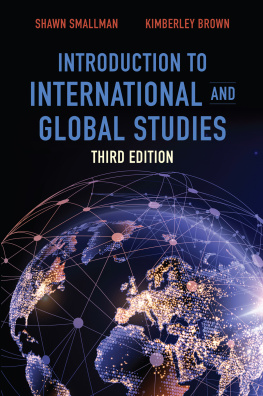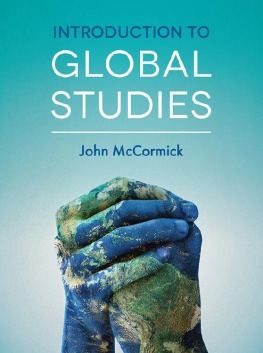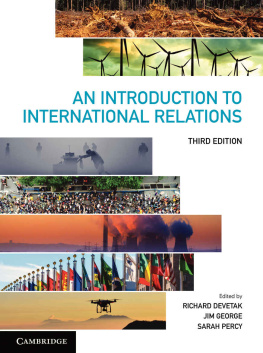2020 The University of North Carolina Press
All rights reserved
Manufactured in the United States of America
Designed and Set in Scala and Scala Sans with Champion by Rebecca Evans.
The University of North Carolina Press has been a member of the Green Press Initiative since 2003.
Cover illustration: iStockphoto.com/Vit_Mar
Library of Congress Cataloging-in-Publication Data
Names: Smallman, Shawn C., author. | Brown, Kimberley, 1966 author.
Title: Introduction to international and global studies / Shawn C. Smallman, Kimberley Brown.
Description: Third edition, revised and expanded. | Chapel Hill : The University of North Carolina Press, 2020. | Includes bibliographical references and index.
Identifiers: LCCN 2019054498 | ISBN 9781469659992 (paperback) | ISBN 9781469660004 (ebook)
Subjects: LCSH: Globalization. | World citizenship. | International cooperation. | International relations.
Classification: LCC JZ1318 .S597 2020 | DDC 327dc23
LC record available at https://lccn.loc.gov/2019054498
ONE Introduction
Lauren grew up in a suburb of Minneapolis, Minnesota. While an undergraduate, she arranged with one of her professors to conduct an independent research project and traveled to Liberia in West Africa for a summer. Upon her return, she worked as an intern for an international nongovernmental agency and, as she completed a political science degree, made plans for a career in the areas of philanthropy and leadership. Following graduation, she joined the Peace Corps and traveled to Cape Verde, where she worked in family health. These experiences helped her choose to earn a graduate degree in public health, as well as a graduate certificate in nonprofit management. In graduate school, she met her future husband, an Indian national. She is now part of a bicultural family in which she and her husband both are working to expose their children to the plethora of cultures around the world through travel and education. She also remains deeply engaged in international philanthropy. Lauren had not initially known where her undergraduate program of study would lead her; she knew only that she thrived on making contact with individuals from other cultures, even as she came to know her own culture better.
Fekade is Ethiopian. His parents emigrated to the United States when he was eight years old. Raised bilingually and biculturally, he attended public elementary and high schools in the Pacific Northwest. His original intention was to find a way to return to Ethiopia to work in some type of international service. Following his undergraduate work in international studies, he has since decided to focus his graduate work on public health and immigrant communities in the United States. He has organized students at his university to participate in activities that focus on the United Nations Millennium Development Goals and to try to make informed choices about everything they do. Contact with other cultures has transformed both his education choices and career choices.
The life trajectories of Lauren and Fekade (whose stories are real but whose names have been changed here) are not unusual. Many people are profoundly touched by their own concern for international questions. Perhaps you will also find your life transformed by your cultural contacts and program of study. But whether or not you choose to look for international career opportunities, your life will be affected by global trends. Some issues, such as those surrounding epidemic disease, may impact you on a deeply personal level. For example, as new strains of influenza emerge, you and your family may have to make choices about finding a vaccine. Similarly, your life is influenced by changes in the global economy. The Chinese government owns a substantial portion of the U.S. governments debt. That means that decisions made in Beijing shape the interest rate that someone in the United States pays for a student loan or a mortgage. Whether you live in Halifax, Canada, or Manchester, England, a global recession or changes in trade patterns may impact the company you work for by opening up new opportunities for sales or moving jobs overseas. When you purchase foods, you are making a choice that affects people you will never see in other parts of the globe, whether you decide to buy shade-grown coffee or fair-trade chocolate. Commodity chains for other productssuch as energyalso shape our daily lives. If political unrest closes the Strait of Hormuz, oil importers could see gasoline rationing. At the same time, European wind companies may invest in turbines that appear near you in Kentucky or Calgary, whether you view this positively or not. Security concerns also will impact your life, perhaps when friends or family are deployed overseas or when you encounter frustration with security measures while traveling.

Map 1 The World (Steph Gaspers 2008)
With cultural globalization, our literature, art, music, trade, and technology are affected by flows of information. You may follow a celebrity twitter in Los Angeles, FaceTime your grandmother in Hong Kong, check your friends Facebook page in London, or follow an international figure on Instagram. Or you may listen to a West African fusion band that has been influenced by Celtic music. You may emigrate someday, or immigrants may shape your community. Perhaps no age has been as touched by global trends as the one you live in. For this reason, it is important for you to learn about international studies, the multidisciplinary field that examines major international issues.
What Is International/Global Studies?
International/global studies (IGS) is an increasingly common major, not only in liberal arts colleges but also in public institutions. What unites all of these programs is that they try to interpret major global trends in a manner that is multidisciplinary; that is, they draw on faculty and ways of looking at the world that come from many different areas (Ishiyama and Breuning 2004; Hey 2004). A scholar in IGS might utilize the writing of political philosophers to describe the global economy or consider how films reflect new trends in cultural globalization. This cross-pollination among multiple disciplines is central to the field. IGS programs also share certain common characteristics, such as an emphasis on language competence and various dimensions of globalization.
The related term global studies is preferred by some scholars because it removes the focus on the nation-state and places it instead on the transnational processes and issues that are key in an era defined by globalization. Global studies programs also often stress the importance of race, class, and gender in international affairs, as well as the importance of social responsibility. Both international studies and global studies programs share a commitment to interdisciplinary work, a focus on globalization and change, and an emphasis on how global trends impact humanity. They both also differ from international relations, an older discipline within political science that emphasizes ties between nations and topics with clear importance to nation-states, such as war, economics, and diplomacy. Finally, both international and global studies share a concern with global citizenship.














